German Chancellor Angela Merkel’s governing Christian Democratic Union (CDU) survived a narrow vote in elections for the eastern state of Saxony-Anhalt.
The right-wing CDU lost 3% of the vote from the previous elections, dropping to 32.6% support. The two other big parties in the state, the far left Die Linke and the centrist Social Democrats (SPD), remained steady on 23.8% and 21.5% respectively.
Merkel’s allies at a federal level — the pro-free market Free Democrats — failed to cross the 5% threshold needed to win a seat, as did the neo-Nazi National Democratic Party (NPD).
-
-
Facing public anger and concern over the nuclear meltdown unfolding in Japan, German Chancellor Angela Merkel announced temporary shutdown of several nuclear reactors. On March 12, more than 60,000 anti-nuclear protesters in the south-western state of Baden-Wuerttemberg formed a 45 kilometre human chain from Stuttgart to the Neckarwestheim 1 nuclear plant. Smaller protests took place in more than 450 towns and cities across Germany, anti-nuclear organisation Irradiated said. More protests are planned for March 26.
-
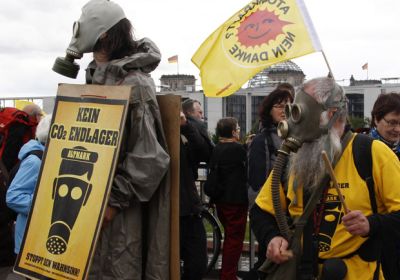 Germany’s centre-right government is facing what many have dubbed a “hot autumn” of protests, as conflict over a range of social, political and environmental issues come to a head across the country. As the governments of Europe attempt to offload the costs of the financial crisis onto working people, German Chancellor Angela Merkel has initiated a series of “austerity” measures aimed to undermine Germany’s social welfare system.
Germany’s centre-right government is facing what many have dubbed a “hot autumn” of protests, as conflict over a range of social, political and environmental issues come to a head across the country. As the governments of Europe attempt to offload the costs of the financial crisis onto working people, German Chancellor Angela Merkel has initiated a series of “austerity” measures aimed to undermine Germany’s social welfare system. -
More than 50,000 German anti-nuclear protesters defied 17,000 police over the weekend of November 6 and 7and blockaded a train carrying spent nuclear fuel rods from France to Germany. On November 8, the fuel rods finally reached the small north German village of Dannenberg. From there, they were trucked a further 20 kilometres to an interim nuclear storage facility in the town of Gorleben. Anti-nuclear activists drove more than 600 tractors, blockading roads and the railway in the largest ever demonstration over the transportation of spent nuclear fuel rods in Germany.
-
 Boats — an enemy evoked by major Australian political parties to win elections — have become a symbol of international resistance to Israel’s blockade of the Gaza Strip. This is particularly the case since Israeli commandos attacked an aid flotilla headed for Gaza in May, killing nine people. With this in mind, the Berlin Coalition for Gaza (BCG) launched a one-boat “flotilla” through an inner-city Berlin canal on October 15.
Boats — an enemy evoked by major Australian political parties to win elections — have become a symbol of international resistance to Israel’s blockade of the Gaza Strip. This is particularly the case since Israeli commandos attacked an aid flotilla headed for Gaza in May, killing nine people. With this in mind, the Berlin Coalition for Gaza (BCG) launched a one-boat “flotilla” through an inner-city Berlin canal on October 15. -
 Coasting on the back of environmental protests and a hemorrhaging two-party system, the German Greens have sent shock waves through German politics, surging into the position of main opposition party for the first time. The Greens, who were part of a coalition government with the Social Democratic Party (SPD) from 1998-2005 at the expense of many of the party’s principles, are benefiting from the unraveling of Germany’s traditional two-party system.
Coasting on the back of environmental protests and a hemorrhaging two-party system, the German Greens have sent shock waves through German politics, surging into the position of main opposition party for the first time. The Greens, who were part of a coalition government with the Social Democratic Party (SPD) from 1998-2005 at the expense of many of the party’s principles, are benefiting from the unraveling of Germany’s traditional two-party system. -
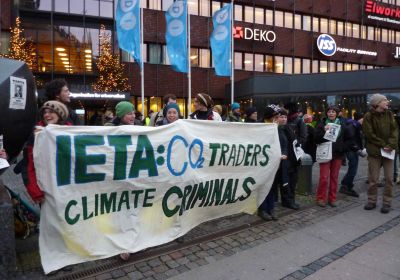 The global carbon market, which trades “pollution rights” to encourage industry to cut greenhouse gas emissions, grew in 2009. Far from signaling a success, this reflects a huge increase in fraud, the dumping of surplus emissions permits by industry, and a rise in financial speculation.
The global carbon market, which trades “pollution rights” to encourage industry to cut greenhouse gas emissions, grew in 2009. Far from signaling a success, this reflects a huge increase in fraud, the dumping of surplus emissions permits by industry, and a rise in financial speculation. -
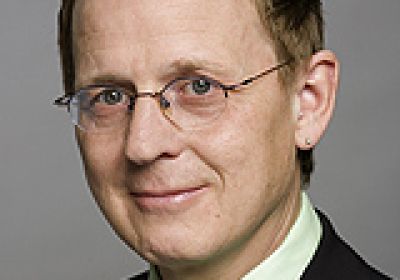 Germany’s Federal Administrative Court ruled on July 21 that the Verfassungsschutz — Germany’s domestic spy agency — had a right to spy on the left-wing party Die Linke. Bodo Ramelow, Die Linke’s leader in the eastern state of Thuringia and others were appealing against the agency spying on them. The justification for the spying are claims Die Linke contained “anti-constitutional” elements because of its origins in the former East German state.
Germany’s Federal Administrative Court ruled on July 21 that the Verfassungsschutz — Germany’s domestic spy agency — had a right to spy on the left-wing party Die Linke. Bodo Ramelow, Die Linke’s leader in the eastern state of Thuringia and others were appealing against the agency spying on them. The justification for the spying are claims Die Linke contained “anti-constitutional” elements because of its origins in the former East German state. -
 The German parliament met on June 30 to elect the country’s largely symbolic president. What should have been a fairly straightforward affair, however, turned into a political embarrassment for Chancellor Angela Merkel. The new election was made necessary by the resignation of Horst Koehler on May 31, after a public outcry over his comments suggesting German military involvement in Afghanistan was commercially motivated. Koehler’s resignation came as Merkel’s governing right-wing coalition was struggling in opinion polls.
The German parliament met on June 30 to elect the country’s largely symbolic president. What should have been a fairly straightforward affair, however, turned into a political embarrassment for Chancellor Angela Merkel. The new election was made necessary by the resignation of Horst Koehler on May 31, after a public outcry over his comments suggesting German military involvement in Afghanistan was commercially motivated. Koehler’s resignation came as Merkel’s governing right-wing coalition was struggling in opinion polls. -
The government of German Chancellor Angela Merkel is in crisis, following the resignation of Germany’s president Horst Koehler on May 31. Koehler — a former head of the International Monetary Fund, and German president since 2004 — resigned after a public backlash against comments he made connecting the German economy with increased overseas military deployments.
-
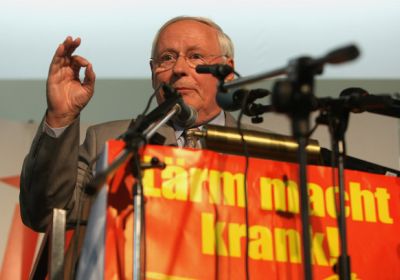 On May 15, German left-wing party Die Linke held its national congress in the eastern city of Rostock, electing a new national leadership and debating its new draft program. At the conference, charismatic left-wing firebrand Oskar Lafontaine stepped down as the party’s co-leader for health reasons. Lafontaine, the former head of the Social Democratic Party (SPD) and finance minister, quit the SPD in 1999 because of the party’s neoliberal policies.
On May 15, German left-wing party Die Linke held its national congress in the eastern city of Rostock, electing a new national leadership and debating its new draft program. At the conference, charismatic left-wing firebrand Oskar Lafontaine stepped down as the party’s co-leader for health reasons. Lafontaine, the former head of the Social Democratic Party (SPD) and finance minister, quit the SPD in 1999 because of the party’s neoliberal policies. -
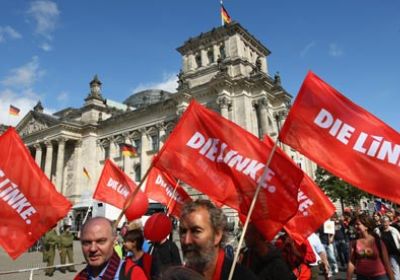 Germany’s ruling centre-right coalition suffered a double defeat on May 9, when it lost its ruling majority in an important state election in North-Rhine Westphalia. Chancellor Angela Merkel’s Christian Democratic Party (CDU) scored its lowest ever vote in the state, dropping 14 points to only 34.6%, on a par with the centre-left Social Democratic Party (SPD), which slipped to 34.5%. Support for the arch-neoliberal Free Democrats (FDP) — the CDU’s coalition partner on a state and federal level — stagnated at 6.8%. The Greens emerged as the big winners, doubling its vote to 12.1%.
Germany’s ruling centre-right coalition suffered a double defeat on May 9, when it lost its ruling majority in an important state election in North-Rhine Westphalia. Chancellor Angela Merkel’s Christian Democratic Party (CDU) scored its lowest ever vote in the state, dropping 14 points to only 34.6%, on a par with the centre-left Social Democratic Party (SPD), which slipped to 34.5%. Support for the arch-neoliberal Free Democrats (FDP) — the CDU’s coalition partner on a state and federal level — stagnated at 6.8%. The Greens emerged as the big winners, doubling its vote to 12.1%.